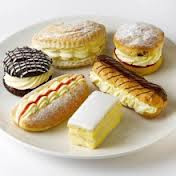Don't Starve Your Characters, pleads Griselda Heppel
‘A very famous
editor once said to me: “Barry, tell them what they eat.”’
This is one of
the delightful pieces of advice given by Barry Cunningham on writing for children. He doesn’t say who the famous editor is – Kaye Webb? – but I love
this nugget for its apparent triviality, actually giving an extremely important
message.
Food matters to children. It’s a big part of their everyday lives and
if you want them to get lost in your story, better make sure you don’t let the
action go on too long without feeding your characters. Yes, you can have scene
breaks, but every now and then your readers will want to know what your hungry
hero will be having for supper; even more so, if supper happens to be a
fabulous party, or a midnight feast planned in the dorm.
 Enid Blyton totally
got this: remember all those picnics enjoyed by the Famous Five, or the illicit
night time snacks shared by boarding school girls in Malory Towers? More
recently J K Rowling began and ended many of the Harry Potter books with lavish
feasts in which everyone ate their favourite dishes; and one of the brilliant
details Robin Stevens puts into her Murder Most Unladylike series is the
crucial part Bunbreak plays in the lives of her characters, in which the total
absence of buns is irrelevant; it’s the different biscuits
Enid Blyton totally
got this: remember all those picnics enjoyed by the Famous Five, or the illicit
night time snacks shared by boarding school girls in Malory Towers? More
recently J K Rowling began and ended many of the Harry Potter books with lavish
feasts in which everyone ate their favourite dishes; and one of the brilliant
details Robin Stevens puts into her Murder Most Unladylike series is the
crucial part Bunbreak plays in the lives of her characters, in which the total
absence of buns is irrelevant; it’s the different biscuits
offered, depending
on the day, that matters.

 Much as I’ve
enjoyed all the vicarious scoffing kindly supplied by the authors above, for me
one children’s author towers above all the rest: C S Lewis.
Much as I’ve
enjoyed all the vicarious scoffing kindly supplied by the authors above, for me
one children’s author towers above all the rest: C S Lewis.
His evocation
of the sheer sensuous pleasure of food – the smell, touch, taste, texture – is
enough to both whet the appetite and satisfy it at the same time. I challenge
anyone reading the Narnia books not to want to dive into the ‘very sweet and foamy
and creamy’ hot drink the White Witch gives Edmund in The Lion, the Witch and
the Wardrobe, or slake their thirst with the delectable fruit that refreshes the
exhausted heroes at the end of The Last Battle (my inspiration for the feast in
Elysium that Ante and her companions tuck into in Ante’s Inferno, as I wrote about here).
So I’m absolutely with Barry Cunningham in this, except I’d say he doesn’t go far enough. It’s not just children whose mouths will water at descriptions of glorious nosh; it works for adults too. No one knew this better than Charles Dickens, whose books abound in depictions of food so tempting the reader can practically taste the ‘red-hot chestnuts, cherry-cheeked apples, juicy oranges, luscious pears, immense twelfth-cakes, and seething bowls of punch, that made the chamber dim with their delicious steam.’ (A Christmas Carol). There’s a joyfulness in these lines, a delight in the simple pleasure of good things to eat, that makes the reader feel all’s well with the world. You know that at some point in the story, the characters will get to sit down and partake of all these yummy things.
Which is why I
felt so sorry for the heroine in Autumn de Wilde’s new film of Emma. (If you
haven’t seen it, do – it is beautifully acted and directed and designed,
costumes and set beyond praise.) Wonderful feasts are repeatedly laid out – for
weddings, Christmas, social gatherings – with marvellous looking Regency meats,
trifles, jellies, cakes and baskets of strawberries – and poor Emma is never
allowed to taste a thing. All around her people tuck in with relish, while she never
even picks up her cutlery. It is
difficult, of course, to look elegant while eating, and certainly wading into
such irresistible things as chocolate eclairs is used to comic effect with Miss
Bates and Harriet Smith – but I can’t help feeling that is a mistake. Call me a
killjoy, but the subliminal message is that only clumsy, unattractive women eat;
luminously beautiful ones like Emma Woodhouse don’t. They live on… what, air?
 |
| No cakes for Emma |
Jane Austen
would have had no time for such nonsense. Food in her lifetime was a serious,
practical necessity, something her heroine had as much right to enjoy as anybody
else. It probably wouldn’t have occurred to de Wilde, directing the film, that
starving her main character was a problem. But speaking as a devourer – in more ways than
one – of great classic fiction, driven by real, flesh-and-blood characters – it
is, believe me.




Comments
Meanwhile, Griselda has written a lovely piece on food and eating in children's and adult's books... I can only add to it that C.S. Lewis's friend J.R.R. Tolkien also homed in on adding delicious food (though somehow often with a bit of 'nursery quality - bread and honey, for example - though what is actually wrong with that? There are also those wafers the Elves favour - energy without substance apparently... (I'd prefer the bread and honey...) and, in the days before smoking was known to be harmful, plenty of smoking along with the good beer...